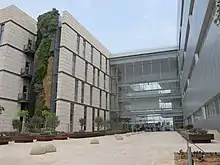Shikun & Binui
Shikun & Binui ; TASE: SKBN) is one of the largest construction and infrastructure, Real Estate and Energy companies in Israel.[2] , it is also an international holding and investment company[3] The company's shares are traded on the Tel Aviv Stock Exchange and are included in the TA-100 Index.
 | |
 Headquarters in Airport City | |
Native name | Hebrew: שיכון ובינוי |
|---|---|
Romanized name | Shikun & Binui |
| Type | Public |
| TASE: SKBN | |
| Industry | Construction, Infrastructures, Real Estate, Concessions, Sea Water Desalinization, Renewable Energy, Industrial Wastewater Treatment |
| Founded | 1924 |
| Founder | Histadrut - General Federation of Labour in Israel |
| Headquarters | Airport City, , |
| Revenue | |
| Total assets | |
| Total equity | |
Number of employees | 11,354 (2014) |
| Footnotes / references [1] | |
History
During the British Mandate (1924—1948)
Shikun & Binui was established in 1924, during the British Mandate for Palestine.[4] It was owned by Solel Boneh the construction arm of the Jewish trade union Histadrut.[5]
Israel, trade union ownership (1948—1996)
After 1948, Shikun & Binui played an important role in building the young state.[4] Among many public building projects, Shikun & Binui constructed Israel’s parliament (Knesset), the Israel Museum, IDF headquarters, government buildings, the Ministry of Defense, courthouses in Tel Aviv and Haifa, the national police academy, and Yitzhak Rabin Center. Shikun & Binui has constructed solar, hydroelectric, nuclear and conventional power plants across Israel, international shipping ports in Ashdod and Haifa, Israeli hospitals, university campuses, water desalination plants, highways, and many of Israel's railways, including light rail.[6] [7]
In 1958, Israel's Foreign Minister Golda Meir encouraged Shikun & Binui's subsidiary Solel Boneh to expand its operations into Africa. [8]Internationally, through its subsidiaries Shikun & Binui built hundreds of miles of roads and bridges and other national infrastructure across Africa and Latin America, hydroelectric plants in Guatemala, the National Library in Nigeria, [9] toll lanes in the United states, commercial and multi-family residential buildings across Europe.[10]
Private company (1996—)
In 1996, Israel's General Federation of Labor (Histadrut) privatized its assets, selling shares of Shikun & Binui to its employees and Ted Arison of the Arison Group.[11]
Since 2007, Shikun & Binui has promoted sustainable initiatives.[12]
In 2010, the company signed a $50 million road repair contract with the government of Tanzania government, its first project in Tanzania.[13]
In June 2012, Shikun U'Binui was excluded from the Government Pension Fund of Norway (Europe's largest equity investor) for its involvement in "the building of settlements in breach of international humanitarian law in East-Jerusalem." [14]In December 2012, it was excluded by the New Zealand Superannuation Fund on similar grounds.[15]
In 2018, Naty Saidoff, a US-based real estate investor, purchased the controlling stake in Shikun & Binui from Shari Arison for NIS 1.1 billion. [16]
In 2016, the company completed the construction of toll roads in metropolitan Houston, Texas for US$1 billion.[17] Meanwhile, it also built Cundinamarca 010, a 100-mile toll road in Bogota, Colombia for US$640 million.[18]
In 2018, Shikun & Binui entered into a partnership with the Israel-based startup IntSite Ltd. to develop autonomous cranes. The technology in question is an artificial intelligence-based system that can operate cranes on construction sites with greater safety.[19]
Main subsidiaries
- Shikun Ovdim
- Solel Boneh Building & Infrastructure
- Solel Boneh International
- Blue-Green
- Lime & Stone Production
- Shikun & Binui – Renewable Energy
Notable projects
See also
References
- Shikun & Binui Ltd. Company Profile Dun & Bradstreet
- Shikun & Binui gets $337M Azerbaijan deal
- Shikun & Binui history, company website
- About Us, Shikun & Binui
- Ross, Andrew (2019) Stone Men. The Palestinians Who Built Israel. Verso. ISBN 978-1-78873-026-6 p. 66
- Our Projects, Shikun & Binui
- Shikun & Binui Ltd., BDi Code
- Africa
- Our Projects, Shikun & Binui
- Dun's 100, Shikun & Binui Real Estate Development (RED)
- History, Shikun & Binui
- Solel Boneh Int'l wins Tanzania road deal
- Naty Saidoff buys Shari Arison's stake in Shikun & Binui, Globes 2018
- "Israeli company to build $640 million toll road in Colombia". Jewish Telegraphic Agency. July 12, 2016. Retrieved July 17, 2016.
- Shikun & Binui to build 154 km toll road in Colombia
- Israeli Real Estate Company Partners With AI Startup IntSite to Develop Autonomous Cranes